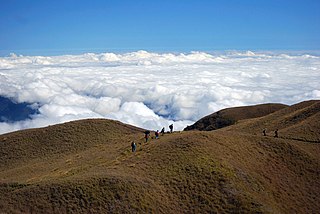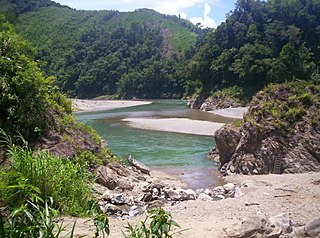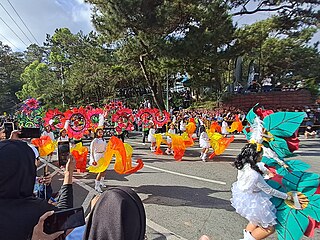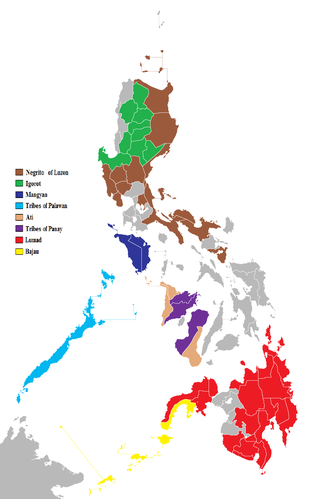
Benguet, officially the Province of Benguet, is a landlocked province of the Philippines located in the southern tip of the Cordillera Administrative Region in the island of Luzon. Its capital is La Trinidad.

Ifugao, officially the Province of Ifugao, is a landlocked province of the Philippines in the Cordillera Administrative Region in Luzon. Its capital is Lagawe and it borders Benguet to the west, Mountain Province to the north, Isabela to the east, and Nueva Vizcaya to the south.

Apayao, officially the Province of Apayao, is a landlocked province in the Philippines in the Cordillera Administrative Region in Luzon. Kabugao serves as its capital. The provincial capitol and its associated offices are located at the New Government Center in Luna.

Kalinga, officially the Province of Kalinga, is a landlocked province in the Philippines situated within the Cordillera Administrative Region in Luzon. Its capital is Tabuk and borders Mountain Province to the south, Abra to the west, Isabela to the east, Cagayan to the northeast, and Apayao to the north. Kalinga and Apayao are the result of the 1995 partitioning of the former province of Kalinga-Apayao which was seen to better service the respective needs of the various indigenous people in both provinces.

Kalinga-Apayao was a province of the Philippines in the Cordillera Administrative Region in the island of Luzon. It was formed, along with Benguet, Ifugao, and the new Mountain Province, from the earlier Mountain Province, with the passage of Republic Act No. 4695 in 1966. The said law was amended by RA No. 7878 in 1995, which divided the province into two new ones, Kalinga and Apayao.

The Cordillera Administrative Region, also known as the Cordillera Region and Cordillera, is an administrative region in the Philippines, situated within the island of Luzon. It is the only landlocked region in the archipelago, bordered by the Ilocos Region to the west and southwest, and by the Cagayan Valley Region to the north, east, and southeast.

The Cordillera Central or Cordillera Range is a massive mountain range 320 kilometres (200 mi) long north–south and 118 kilometres (73 mi) east-west situated in the north-central part of the island of Luzon, in the Philippines. The mountain range encompasses all provinces of the Cordillera Administrative Region, as well as portions of eastern Ilocos Norte, eastern Ilocos Sur, eastern La Union, northeastern Pangasinan, western Nueva Vizcaya, and western Cagayan.

The indigenous peoples of the Cordillera in northern Luzon, Philippines, often referred to by the exonym Igorot people, or more recently, as the Cordilleran peoples, are an ethnic group composed of nine main ethnolinguistic groups whose domains are in the Cordillera Mountain Range, altogether numbering about 1.8 million people in the early 21st century.

The Kalinga people are an indigenous ethnic group whose ancestral domain is in the Cordillera Mountain Range of the northern Philippines. They are mainly found in Kalinga province which has an area of 3,282.58 sq. km. Some of them, however, already migrated to Mountain Province, Apayao, Cagayan, and Abra. The Kalinga numbered 163,167 as of 2010.

The Panagbenga Festival, also called the Baguio Flower Festival, is a month-long annual flower occasion in Baguio, Philippines. The festival, held in February, was created as a tribute to the city's flowers and as a way to rise from devastation of the 1990 Luzon earthquake. The festival includes floats that are covered mostly with flowers. The festival also includes street dancing, presented by dancers clad in flower-inspired costumes, that is inspired by the Bendian, an Ibaloi dance of celebration that came from the Cordilleras.

The indigenous peoples of the Philippines are ethnolinguistic groups or subgroups that maintain partial isolation or independence throughout the colonial era, and have retained much of their traditional pre-colonial culture and practices.

The pasiking is the indigenous basket-backpack found among the various ethno-linguistic groups of Northern Luzon in the Philippines. Pasiking designs have sacred allusions, although most are purely aesthetic. These artifacts, whether handwoven traditionally or with contemporary variations, are considered exemplars of functional basketry in the Philippines and among Filipinos.

The Kankanaey people are an indigenous peoples of northern Luzon, Philippines. They are part of the collective group of indigenous peoples in the Cordillera known as the Igorot people.
The Chico River Dam Project was a proposed hydroelectric power generation project involving the Chico River on the island of Luzon in the Philippines that locals, notably the Kalinga people, resisted because of its threat to their residences, livelihood, and culture. The project was shelved in the 1980s after public outrage in the wake of the murder of opposition leader Macli-ing Dulag. It is now considered a landmark case study concerning ancestral domain issues in the Philippines.
The Cordillera People's Liberation Army (CPLA) was a militant organization based in the Cordillera region in the Philippines founded by Conrado Balweg.

Macli-ing Dulag (customarily referred to by his first name, also spelled Macliing or Macli'ing was a pangat of the Butbut tribe of Kalinga province in the Philippines. He is best known as one of the leaders of the opposition to the Chico River Dam Project, which led to his assassination by armed forces under the command of then-president Ferdinand Marcos.
The Asia Indigenous Peoples Pact (AIPP) is a regional organization founded in 1992 by indigenous peoples’ movements. AIPP promotes and defend indigenous peoples’ human rights, including land rights and cultural rights.

Regina Paz "Gina" La'o Lopez was a Filipino environmentalist and philanthropist who served as Secretary of the Philippines' Department of Environment and Natural Resources (DENR) in an ad interim basis under the Duterte administration. She was previously the Chairperson of the Pasig River Rehabilitation Commission under two consecutive administrations. Lopez was also a yoga missionary and a pioneer for corporate social responsibility.
Joanna Patricia Kintanar Cariño is a Filipina human rights activist, educator, researcher, and co-founder of the Cordillera People's Alliance (CPA), SELDA Northern Luzon and SANDUGO.
Indigenous people’s resistance against the Marcos dictatorship varied from case to case among the various indigenous peoples of the Philippines. The most documented cases are the various resistance movements towards the Marcos administration’s appropriation of indigenous lands, particularly in the case of the Chico River Dam Project and the Manila Water Supply III project on the Kaliwa River watershed, and the birth of the various separatist groups and their coalescing into the Moro conflict in the wake of news about the Jabidah Massacre.
















